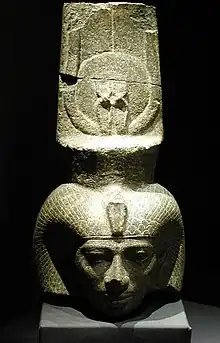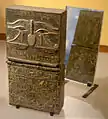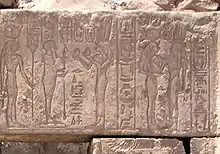Shepenupet II
Shepenupet II (alt. Shepenwepet II, prenomen: Henutneferumut Irietre) was an ancient Egyptian princess of the 25th Dynasty who served as the high priestess, the Divine Adoratrice of Amun, from around 700 BC to 650 BC. She was the daughter of the first Kushite pharaoh Piye[2] and sister of Piye's successors, Shabaka and Taharqa.
| Shepenupet II | ||||||||||||||||||||||||||||||
|---|---|---|---|---|---|---|---|---|---|---|---|---|---|---|---|---|---|---|---|---|---|---|---|---|---|---|---|---|---|---|
 Head of Shepenupet II from Alexandria National Museum, Egypt | ||||||||||||||||||||||||||||||
| Divine Adoratrice of Amun God's Wife of Amun | ||||||||||||||||||||||||||||||
| Tenure | around 700–650 BC | |||||||||||||||||||||||||||||
| Predecessor | Amenirdis I | |||||||||||||||||||||||||||||
| Successor | Amenirdis II (as Divine Adoratrice) Nitocris I (as God's Wife)
| |||||||||||||||||||||||||||||
| Burial | ||||||||||||||||||||||||||||||
| Dynasty | 25th Dynasty | |||||||||||||||||||||||||||||
| Father | Piye | |||||||||||||||||||||||||||||
Biography
Shepenupet II was adopted by her predecessor in office, Amenirdis I, a sister of Piye. Shepenupet was God's Wife of Amun from the beginning of Taharqa's reign until Year 9 of Pharaoh Psamtik I. While in office she had to come to a power sharing arrangement with the mayor of Thebes, Mentuemhat.[3]
Her niece, Amenirdis, the daughter of Taharqa, was appointed as her heiress.[3] Shepenupet was compelled to adopt Nitocris, daughter of pharaoh Psamtik I, who reunited Egypt after the Assyrian conquest. This is evidenced by the so-called Adoption Stela of Nitocris. In 656 BC, in Year 9 of the reign of Psamtik I, she received Nitocris at Thebes.[4][5]
Her tomb is located in the grounds of Medinet Habu.[6] She was succeeded as Divine Adoratrice by Amenirdis II, who was succeeded by Nitocris I.
Images
 Shepenupet II at Medinet Habu
Shepenupet II at Medinet Habu Shepenupet II and Amenirdis II at Medinet Habu
Shepenupet II and Amenirdis II at Medinet Habu Chapel of Shepenupet at Medinet Habu
Chapel of Shepenupet at Medinet Habu Shepenupet's cartouche
Shepenupet's cartouche Box with name of Shepenupet
Box with name of Shepenupet Shepenupet and Amenirdis II
Shepenupet and Amenirdis II
References
- von Beckerath, Jürgen (1999). Handbuch der Ägyptischen Königsnamen (in German). Mainz am Rhein, Von Zabern. ISBN 3-8053-2591-6. pp. 210-11
- John Boardman ed., The Cambridge Ancient History Vol.III, Cambridge University Press 1982, ISBN 0-521-24289-4, p.136
- Michael Rice, Who's Who in Ancient Egypt, Routledge 2001, p.189
- J. H. Breasted, Ancient Records of Egypt, Part Four: "The Adoption Stela of Nitocris" §§ 945
- Sergio Donadoni, The Egyptians, University of Chicago Press 1997, ISBN 0-226-15556-0 p.141
- Dodson, Aidan; Hilton, Dyan (2004). The Complete Royal Families of Ancient Egypt. London: Thames & Hudson. ISBN 0-500-05128-3., p.240